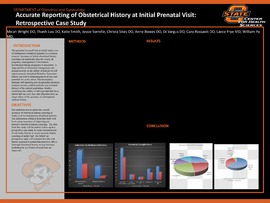| dc.contributor.author | Wright, Micah | |
| dc.contributor.author | Luu, Thanh | |
| dc.contributor.author | Smith, Katie | |
| dc.contributor.author | Sorrelle, Jessie | |
| dc.contributor.author | Sikes, Christa | |
| dc.contributor.author | Bowes, Anne | |
| dc.contributor.author | Vargus, DJ | |
| dc.contributor.author | Rossavik, Caro | |
| dc.contributor.author | Frye, Lance | |
| dc.contributor.author | Po, William | |
| dc.contributor.author | Oraee, Dan | |
| dc.date.accessioned | 2020-04-14T16:12:38Z | |
| dc.date.available | 2020-04-14T16:12:38Z | |
| dc.date.issued | 2019-02-22 | |
| dc.identifier | ouhd_wright_accuratereportingof_2019 | |
| dc.identifier.citation | Wright, M., Luu, T., Smith, K., Sorrelle, J., Sikes, C., Bowes, A., Vargus, D., Rossavik, C., Frye, L., Po, W., & Oraee, D. (2019, Feb. 22). Accurate reporting of obstetrical history at initial prenatal visit: Retrospective case study. Poster presented on Research Day at the Oklahoma State University Center for Health Sciences, Tulsa, OK. | |
| dc.identifier.uri | https://hdl.handle.net/11244/323876 | |
| dc.description.abstract | Background: The potential for recall bias at initial intake visit of multiparous obstetrical patients is a common concern. Accuracy of initial obstetrical history reporting can drastically alter the course of pregnancy management if information documented during pregnancy is inaccurate. This retrospective study assess the overall accuracy of obstetrical history reporting at intake visit for multiparous obstetrical patients. | |
| dc.description.abstract | Methods: Delivery record data was collected from January 2016-Febuary 2018 (time frame of our current EMR use within the department clinic) using our attending physicians name as the delivering physicians. Research collection specific patient reported obstetrical history: Delivery records retrieved from the initial electronic medical record searches were screened by all authors. EMR delivery record data was compared with the obstetrical history accessible at our department clinic for comparison of accuracy in data reporting. | |
| dc.description.abstract | Results: 321 delivery records were retained for final analysis. Of these remaining records, 318 (99%) recorded accurate type of delivery, 301 (94%) accurately recorded year of delivery, 292 (91%) accurately recorded Gravida and Para history, 208 (65%) reported accurate gestational age at delivery, and 186 (58%) accurately recorded delivery weight. | |
| dc.description.abstract | Conclusion: Overall results suggest that our patient population was accurate at recording routine obstetrical information on initial prenatal visit. However, poor accuracy was noted in reporting more detailed obstetrical information that potentially would have an impact on management of future pregnancies. The results obtained from this study will be used to create measures to improve our patient's obstetrical history reporting. The data from this study will be used in follow up for a prospective case study following the creation of new protocols in our intake history created to assure accurate history reporting at initial visit. The follow up prospective study will compare this rate with history reported at postpartum interview after a thorough obstetrical history review has been performed to see if rates of recall bias are improved. | |
| dc.format | application/pdf | |
| dc.language | en_US | |
| dc.publisher | Oklahoma State University Center for Health Sciences | |
| dc.rights | The author(s) retain the copyright or have the right to deposit the item giving the Oklahoma State University Library a limited, non-exclusive right to share this material in its institutional repository. Contact Digital Resources and Discovery Services at lib-dls@okstate.edu or 405-744-9161 for the permission policy on the use, reproduction or distribution of this material. | |
| dc.title | Accurate reporting of obstetrical history at initial prenatal visit: Retrospective case study | |
| osu.filename | ouhd_wright_accuratereportingof_2019.pdf | |
| dc.type.genre | Presentation | |
| dc.type.material | Text | |
